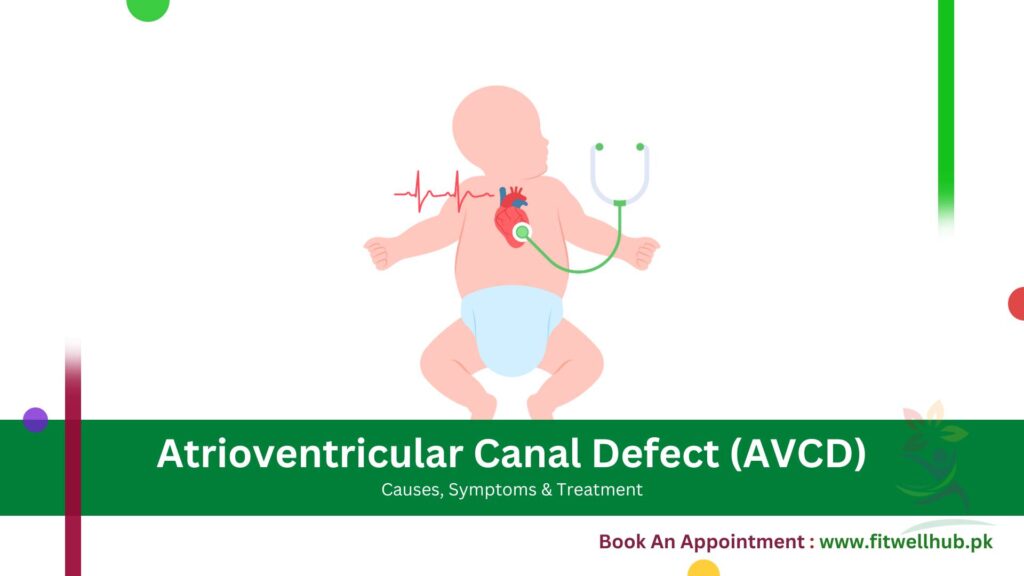Atrioventricular canal defect is one of the most common congenital cardiac conditions, that affects the structure of the heart mainly the chambers and valves responsible for blood flow. This defect occurs when the heart doesn’t form properly during fetal development.
Quick Links
ToggleIt results in a single large opening between the lower chambers (ventricles) and upper chambers (atria) of the heart rather than the two normal distinct openings in a healthy heart. It can cause irregular blood flow, resulting in abnormal blood circulation to the lungs. As time passes, it can raise the risk of heart failure and pulmonary hypertension, if not treated promptly. AVCD generally needs early intervention such as surgical correction, to improve the patient’s quality of life and prevent long-term complications.
Types
The two types of AVCD are partial and complete.
Partial AVCD: In this type, the hole size is small and a little division is present between the chambers.
Complete AVCD: A single hole is present in this type, and tricuspid and mitral valves are not developed properly.
Both types can be life-threatening if untreated, but modern Western Standard Healthcare Facilities in Pakistan provide advanced surgical and therapeutic options for management.
Symptoms Of Atrioventricular Canal Defect (AVCD)
Its symptoms can be mild and difficult to identify in infants. With the progress of the defect, significant symptoms may appear due to an overload of the heart. A few noticeable symptoms are:
- Shortness of breath: Due to abnormal blood flow in the heart, individuals with AVCD may have difficulty breathing, especially during physical activities. This condition is due to the struggle of the heart to pump blood efficiently, resulting in an accumulation of fluid in the lungs.
- Frequent respiratory infections: As AVCD causes fluid to accumulate in the lungs, children and infants with this defect are more prone to respiratory infections such as bronchitis and pneumonia.
- Poor weight gain in infants: Babies with AVCD often have trouble gaining weight. This can happen because their heart works harder than it should, using up more energy and leaving less for growth and development.
- Excessive sweating: Infants and children with AVCD tend to sweat more than usual, especially during feeding or physical exertion. This occurs because of the excessive effort of the heart to pump blood in the whole body.
- Cyanosis (bluish skin): Decreased oxygen levels in the blood can cause cyanosis, in which the nails, skin, and lips produce a bluish tint, showing poor circulation of oxygen.
- Fatigue: People with this defect may feel tired while performing daily activities. This is due to the heart’s struggle to work properly, decreasing the energy levels.
- Swollen abdomen or legs: An overloaded heart can result in the retention of fluid in the body, developing a condition named edema in which swelling occurs in the abdomen, legs, or feet.
When to See a Doctor
Caregivers and parents of infants should monitor the early symptoms of AVCD, especially difficulty feeding, shortness of breath, and the appearance of bluish skin. If these symptoms appear, it is necessary to get medical care. Prompt diagnosis and treatment can stop severe complications and ensure better disease management.
FitwellHub provides the services of pediatric cardiologists who offer consultation and specialized treatment plans for congenital heart defects, including AVCD.
Causes
The exact cause of the defect is unknown, but various factors are described as the causes of its occurrence. Some of the major causes are:
1- Genetic disorders
AVCD is often associated with genetic conditions such as Down syndrome. Approximately 20-25% of children born with Down syndrome have AVCD. Various other genetic disorders can also raise the chances of congenital heart defects.
2- Maternal diabetes
Women with poorly controlled diabetes during pregnancy are at high risk of giving birth to children with heart defects, including AVCD.
3- Environmental factors
Exposure to environmental toxins, such as certain drugs and chemicals, during pregnancy, may increase the likelihood of AVCD development in the fetus.
4- Alcohol intake during pregnancy
Consumption of alcohol during pregnancy can lead to various birth abnormalities such as AVCD, as it can disrupt the heart formation in the baby during the early days of pregnancy.
5- Rubella or viral infections during pregnancy
Contracting infections like rubella (German measles) during pregnancy, particularly in the first trimester, significantly increase the risk of fetal heart defects, including AVCD.
6- Family history of heart defects
A family history of congenital heart defects may increase the likelihood of AVCD in a child. Genetic counseling may be recommended for families with a history of congenital heart disease.
Risk Factors
Various factors raise the chances of AVCD in newborns. These involve:
- Advanced maternal age: Women above 35 years are more susceptible to giving birth to a child with congenital defects such as AVCD, as chances increase with the increase in maternal age.
- Inadequate prenatal care: During pregnancy, the absence of adequate medical care increases the risk of congenital defects such as AVCD.
FitwellHub provides access to genetic counseling and expert advice through its smart clinic to manage risk factors.
Complications
When this congenital defect is not treated, it can result in severe complications that affect the lungs and heart function. Some of the complications are:
- Heart failure: Untreated AVCD can cause heart failure because the heart becomes unable to pump blood effectively and can’t fulfill the body’s requirements.
- Pulmonary hypertension: Excessive blood circulation to the lungs due to AVCD can cause pulmonary hypertension, in which the blood pressure becomes dangerously high in the arteries of the lungs.
- Arrhythmias: Abnormal heart rhythms, known as arrhythmias, are common in people with AVCD and can result in additional complications in congenital defects.
- Stroke: Blood clots develop due to irregular blood circulation, raising the chances of severe complications such as stroke.
- Developmental delays: AVCD results in decreased oxygen levels in young children and infants, which can slow their development and growth, causing delays in cognitive and physical achievements.
- Heart valve disease: With time, the structural defects that occur due to AVCD can result in malfunctions or valve leakage, which may need additional surgical intervention.
Prevention
A few effective preventive measures that are specifically important for pregnant women or those planning to become pregnant are:
1- Proper prenatal care
Regular examination during pregnancy is important for evaluating the health of the fetus and mother. Early diagnosis of significant complications can ensure better treatment results.
2- Managing pre-existing conditions
Women with persistent diseases such as diabetes should seek medical care from their doctor continuously to prevent complications during pregnancy.
3- Avoiding alcohol and smoking
Pregnant women should avoid alcohol and smoking, both of which are associated with an increased risk of birth defects, including AVCD.
4- Vaccinations
Staying up to date on vaccinations, especially for rubella, can assist in preventing infections that may cause congenital heart defects.
5- Genetic counseling
Families with a history of congenital heart defects should consider genetic counseling before planning future pregnancies. This can help assess the risk and guide decision-making.
FitwellHub supports expectant mothers through programs like the Healthy Elite Lifestyle Program, which helps reduce the risk of congenital defects by promoting maternal health. To book an appointment, visit our help page.
Diagnosis
AVCD is generally diagnosed with the help of physical check-ups, imaging, and diagnostic tests in order to evaluate the structure and function of the heart.
Tests
| Test | Description |
|---|---|
| Echocardiogram | Uses sound waves to produce images of the heart, helping detect structural defects like AVCD. |
| Electrocardiogram (ECG) | Identifies the heart’s electrical activity, assisting in detecting irregular rhythms common in heart defects. |
| Chest X-ray | Reveals signs of AVCD such as an enlarged heart or fluid buildup in the lungs. |
| MRI | Provides detailed images of the heart’s structure to evaluate congenital defects and plan surgical interventions. |
| Cardiac Catheterization | An invasive test that involves inserting a thin tube into the heart to monitor oxygen levels and pressure in the chambers. |
FitwellHub has advanced diagnostic labs to diagnose heart defects promptly. To schedule a test, visit the labs.
Treatment
The main treatment approach for AVCD includes surgical repair to correct the heart’s structural irregularities. The purpose of surgery is to close the large hole between the chambers and develop the valves again, leading to normal blood circulation.
1- Surgical repair
During open-heart surgery, the surgeon closes the abnormal hole and reconstructs the heart valves to ensure efficient blood circulation between the chambers.
2- Medications
As surgery is the primary option to treat AVCD, medicines are also required to alleviate symptoms before surgery, control heart failure, decrease fluid buildup, and maintain the patient’s health.
3- Follow-up care
Regular checkups are crucial after surgery to ensure the heart functions properly. Follow-up visits with a cardiologist assist in monitoring the patient’s recovery and timely addressing any chronic health issues.
Medications
Before or after surgery, medications are frequently prescribed in order to manage symptoms. These drugs help reduce the strain on the heart and improve overall heart function.
- Diuretics: These medications help reduce fluid retention in the lungs and body, alleviating symptoms of heart failure associated with AVCD.
- ACE inhibitors: Angiotensin-converting enzyme (ACE) inhibitors relax blood vessels, lowering blood pressure and reducing the heart’s workload.
- Beta-blockers: Beta-blockers control the heart rate and reduce strain on the heart, particularly in cases of arrhythmia.
FitwellHub’s pharmacy provides these medications to help manage symptoms of AVCD. To place an order, visit our pharmacy.
Frequently Asked Questions (FAQ’s)
Symptoms include shortness of breath, frequent respiratory infections, poor weight gain, excessive sweating, cyanosis, fatigue, and swollen abdomen or legs.
AVCD repair involves open-heart surgery to close the hole between the heart chambers and reconstruct the valves for normal blood flow.
AVCD has two types: partial (a small hole with some division) and complete (one large hole with undeveloped valves).
AVCD has a large hole impacting both atria and ventricles with valve abnormalities, whereas ASD is a defect only in the atrial septum.
Treatment includes surgical repair, medications to manage symptoms, and follow-up care to monitor heart function and recovery.











